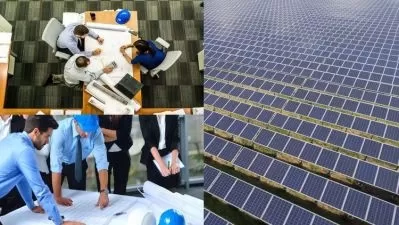Solar Power Course
Khawar Nehal
4:01:32
Description
Fundamentals of solar power
What You'll Learn?
- Develop the vocabulary and communication skills necessary to confidently discuss the solar industry.
- Identify factors that reduce or enhance solar irradiation.
- Understand a bit about Photovoltaic system electrical design
- Understand a bit about Photovoltaic system mechanical design
Who is this for?
What You Need to Know?
More details
DescriptionCourse Title: Solar Power Fundamentals
Course Outline:
Module 1: Introduction to Solar Power
1.1 Overview of solar energy
1.2 Historical development and current status of solar power
1.3 Environmental and economic benefits of solar energy
1.4 Solar power technologies and applications
Module 2: Solar Radiation and Site Assessment
2.1 Solar radiation basics
Solar Position
Basic solar movement and effect of earth tilt.
Study solar movement and the tilt of the earth.
How to predict solar position and understand how this pertains to your job.
Angular effects on the irradiance of solar array.
2.2 Measurement and characterization of solar radiation
2.3 Factors affecting solar radiation availability
2.4 Site assessment for solar power systems
Module 3: Photovoltaic (PV) Systems
3.1 Introduction to photovoltaic technology
3.2 PV system components: solar panels, inverters, and batteries
3.3 Types of PV systems: grid-tied, off-grid, and hybrid systems
3.4 Sizing and design considerations for PV systems
PV Module Fundamentals
3.5 Types of PV systems and their features and benefits.
3.6 How solar cells convert sunlight into electric power.
3.7 Explore how sunlight can be converted to usable power and understand module output values.
3.8 Label key points on an IV curve.
3.9 Illustrate effect of series and parallel connections on IV curve.
3.10 Measurement conditions for solar cells and modules.
3.11 How to compute electrical output, as well as how to compare characteristics of various module technologies.
Module 4: PV System Installation and Maintenance
4.1 Safety considerations for PV system installation
4.2 Installation process and best practices
4.3 Commissioning and testing of PV systems
4.4 Learn how to work safely around operational and non-operational PV systems.
4.5 Identify safety hazards, practices and protective equipment used during PV system installation and maintenance.
4.6 Maintenance and troubleshooting of PV systems
Module 5: Solar Thermal Systems
5.1 Overview of solar thermal technology
5.2 Types of solar thermal systems: flat plate collectors, evacuated tube collectors, and concentrating collectors
5.3 Applications of solar thermal systems: water heating, space heating, and cooling
5.4 Sizing and design considerations for solar thermal systems
Module 6: Solar Power Policies and Regulations
6.1 Global and regional solar power policies
6.2 Incentives and subsidies for solar power systems
6.3 Net metering and feed-in tariffs
6.4 Environmental and regulatory considerations for solar power projects
Module 7: Solar Power Project Development and Economics
7.1 Project development process for solar power projects
7.2 Financial analysis and feasibility assessment
7.3 Project financing options and models
7.4 Economic and financial benefits of solar power projects
Module 8: Emerging Trends in Solar Power
8.1 Advanced solar power technologies: thin-film PV, concentrated solar power, and solar tracking systems
8.2 Energy storage technologies for solar power systems
8.3 Integration of solar power with smart grids and microgrids
8.4 Future prospects and challenges in solar power
9. Inverters
9.1 Off Grid
9.2 On Grid
9.3 Hybrid
9.4 Generators and Inverters
9.5 UPSes
9.6 Line Interactive
9.7 Online
9.8 Standby
Who this course is for:
- Beginners who would like to know about solar power
Course Title: Solar Power Fundamentals
Course Outline:
Module 1: Introduction to Solar Power
1.1 Overview of solar energy
1.2 Historical development and current status of solar power
1.3 Environmental and economic benefits of solar energy
1.4 Solar power technologies and applications
Module 2: Solar Radiation and Site Assessment
2.1 Solar radiation basics
Solar Position
Basic solar movement and effect of earth tilt.
Study solar movement and the tilt of the earth.
How to predict solar position and understand how this pertains to your job.
Angular effects on the irradiance of solar array.
2.2 Measurement and characterization of solar radiation
2.3 Factors affecting solar radiation availability
2.4 Site assessment for solar power systems
Module 3: Photovoltaic (PV) Systems
3.1 Introduction to photovoltaic technology
3.2 PV system components: solar panels, inverters, and batteries
3.3 Types of PV systems: grid-tied, off-grid, and hybrid systems
3.4 Sizing and design considerations for PV systems
PV Module Fundamentals
3.5 Types of PV systems and their features and benefits.
3.6 How solar cells convert sunlight into electric power.
3.7 Explore how sunlight can be converted to usable power and understand module output values.
3.8 Label key points on an IV curve.
3.9 Illustrate effect of series and parallel connections on IV curve.
3.10 Measurement conditions for solar cells and modules.
3.11 How to compute electrical output, as well as how to compare characteristics of various module technologies.
Module 4: PV System Installation and Maintenance
4.1 Safety considerations for PV system installation
4.2 Installation process and best practices
4.3 Commissioning and testing of PV systems
4.4 Learn how to work safely around operational and non-operational PV systems.
4.5 Identify safety hazards, practices and protective equipment used during PV system installation and maintenance.
4.6 Maintenance and troubleshooting of PV systems
Module 5: Solar Thermal Systems
5.1 Overview of solar thermal technology
5.2 Types of solar thermal systems: flat plate collectors, evacuated tube collectors, and concentrating collectors
5.3 Applications of solar thermal systems: water heating, space heating, and cooling
5.4 Sizing and design considerations for solar thermal systems
Module 6: Solar Power Policies and Regulations
6.1 Global and regional solar power policies
6.2 Incentives and subsidies for solar power systems
6.3 Net metering and feed-in tariffs
6.4 Environmental and regulatory considerations for solar power projects
Module 7: Solar Power Project Development and Economics
7.1 Project development process for solar power projects
7.2 Financial analysis and feasibility assessment
7.3 Project financing options and models
7.4 Economic and financial benefits of solar power projects
Module 8: Emerging Trends in Solar Power
8.1 Advanced solar power technologies: thin-film PV, concentrated solar power, and solar tracking systems
8.2 Energy storage technologies for solar power systems
8.3 Integration of solar power with smart grids and microgrids
8.4 Future prospects and challenges in solar power
9. Inverters
9.1 Off Grid
9.2 On Grid
9.3 Hybrid
9.4 Generators and Inverters
9.5 UPSes
9.6 Line Interactive
9.7 Online
9.8 Standby
Who this course is for:
- Beginners who would like to know about solar power
User Reviews
Rating
Khawar Nehal
Instructor's Courses
Udemy
View courses Udemy- language english
- Training sessions 54
- duration 4:01:32
- Release Date 2023/08/25









